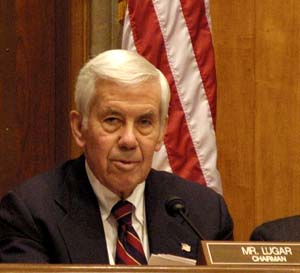The world faces an estimated 50 percent chance of a nuclear, biological or chemical attack over the next five years, according to national security analysts surveyed for a congressional study released Wednesday.
Those chances increase to 70 percent over the coming decade years, says the report, which is based on a compilation of commentary by 85 expert groups on non-proliferation, the environment and national security world-wide, which included The Bellona Foundation.
The Senate Foreign Relations Committee, chaired by Republican Senator Richard Lugar, surveyed analysts around the world in late 2004 and early this year to determine how critical they considered the threat posed by weapons of mass destruction. The committees study is entitled The Lugar Survey on Proliferation Threats and Responses.
The study was commissioned by Lugar—who with former Georgia Democratic Senator Sam Nunn founded the Nunn-Lugar, or Co-operative Threat Reduction (CTR), act—whose non-proliferation efforts in Congress have helped the states of the former Soviet Union reduce their stockpiles of nuclear, chemical and biological weapons. The CTR programme is driven by the US Department of Defence, and was the first of its kind to spring up after the dissolution of the Soviet Union.
"The bottom line is this: For the foreseeable future, the United States and other nations will face an existential threat from the intersection of terrorism and weapons of mass destruction," Lugar said in a statement.
Senate Foreign Relations Committee aides sent the survey to experts asking respondents to estimate the percentage probability that a radiological, biological, and chemical attack would occur over the next five to 10 years.
"If one compounds these answers, the odds of some type of WMD attack occurring during the next decade are extremely high," said the report, using the acronym for weapons of mass destruction.
The study concluded that there is a significantly higher, risk of a radiological attack for both the next five year and 10 year period. It also found that the risk of a biological or chemical attack were almost on part with a nuclear attack of some sort, but that the percentage risk for biological or chemical attacks were almost even.
The survey also reported that:
Three-fourths of those surveyed said one or two new countries would acquire nuclear weapons during the next five years, and as many as five new countries could have such weapons over the next 10 years as technology sharing between terrorist group could inrease. Respondents also said that the likelihood of a state sponsored nuclear attack were lower than those posed by terrorist cells.
Four-fifths of those surveyed said their country was not spending enough money on non-proliferation efforts. Only one fifth said their governments were spending the right amount on non-proliferation efforts designed at averting a terrorist attack.
Respondents also were in agreement that material to design a crude or sophisticated nuclear weapon would most likely come from black market purchases. With only 37 percent of Russian weapons-usable nuclear material under reliable lock and key, coupled with the poverty of former Russians weapons scientists, makes both the material and the know-how available on the black market.
Bellonas Involvement
Bellonas Nuclear physicist Nils Bøhmer filled out the survey for The Bellona Foundation.
The finding of international experts is that there is a high chance of terrorists obtaining Russian nuclear material, so efforts of nations donating to Russian nuclear remediation must focus on this problem with special attention, he said.
He added that donor countries contributing to Russias nuclear security must also assure that their donations do more good than harm and do not inadvertently make this material even more vulnerable than it is. For more than the past decade, international efforts have paid for shipments of spent nuclear fuel—containing uranium and plutonium—from Russias Northern Fleet to the Mayak Chemical Combine, some 3000 kilometers to the south in the southern Urals for reprocessing.
Shipping this material such a distance by train makes it more vulnerable to terrorists, said Bøhmer. Reprocessing this uranium and plutonium make it a significant security risk at a plant that has questionable security to begin with.
Bellona report singled out as required reading by Lugar survey
Bøhmer, with Igor Kudrik, Alexander Nikitin and Charles Digges, and Russian nuclear experts Vladimir Kuznetsov and Vladislav Larin, is a co-author of Bellonas newest report The Russian Nuclear Industry – The Need for Reform.
This new Bellona report is included in the Lugar Survey on Proliferation Threats and Responses as recommended reading. It was released to United States audiences on Capitol Hill and at an event co-sponsored by the Carnegie Endowment for International Peace and the Centre for Strategic and International Studies.
"I’ve long admired the work of the Bellona Foundation for its work in support of counter-proliferation efforts, especially with the Nunn-Lugar Cooperative Threat Reduction program. Bellona continues to break new ground on issues we need to pursue," said Lugar of the report upon its release.
Lugar underscored in his committees survey the importance of augmenting nuclear weapons and material security world-wide. He wrote that though the US should have success in democracy-building throughout the world, the world will never be safe from small, fanatical cells that could possibly get their hands on nuclear materials. Hindering these groups from doing this is a far more important task than the weapons control efforts that were at the centre of the world non-proliferation stage in the 1970s and 1980s.




